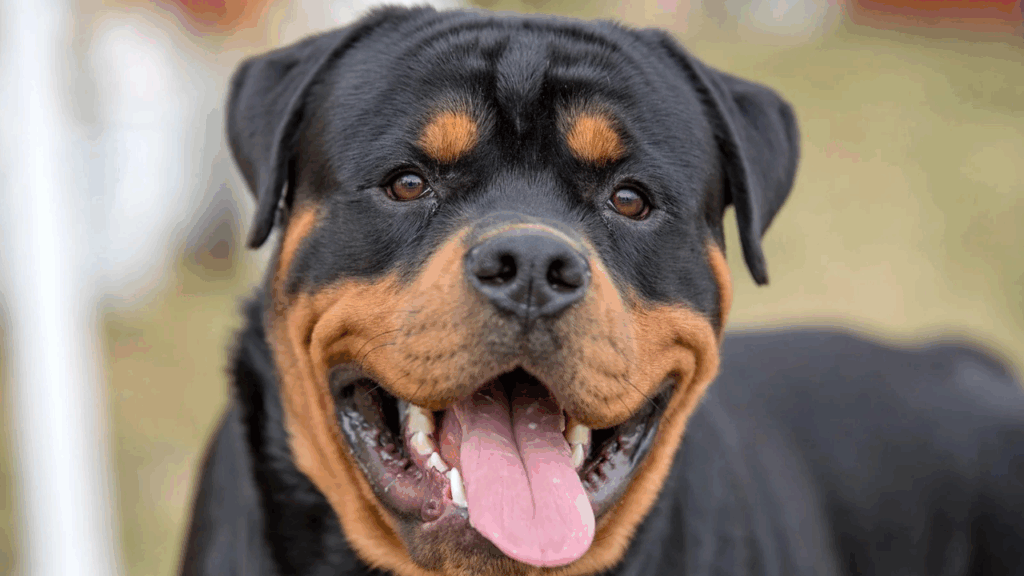The Rottweiler, often misunderstood due to its powerful physique and guarding instincts, is actually a loyal, intelligent, and affectionate breed. Known for its strength, confidence, and protective nature, the Rottweiler is one of the oldest herding breeds and remains a favorite among dog lovers for its versatility, loyalty, and deep bond with its family.
History and Origins
The Rottweiler has a long and noble history, dating back to the Roman Empire. Roman legions used mastiff-type dogs to drive and guard cattle as they marched across Europe. These dogs eventually settled in what is now Germany, particularly around the town of Rottweil, where they were bred with local dogs to develop a strong, dependable breed used for herding and guarding livestock.
These dogs became known as Rottweiler Metzgerhunds, or “Butcher’s Dogs of Rottweil,” because they were used to pull carts laden with meat and goods to market. Their strength and dependability made them invaluable working dogs. Over time, the need for drover dogs declined, but Rottweilers found new roles in police work, search and rescue, guarding, and as family protectors.
The breed was officially recognized by the American Kennel Club (AKC) in 1931 and has since gained worldwide recognition as a powerful and loyal working dog.
Physical Characteristics
The Rottweiler is a large, muscular, and robust dog, built for strength and endurance. Males typically weigh between 95 to 135 pounds, while females weigh 80 to 100 pounds. Their height ranges from 22 to 27 inches at the shoulder.
They have a broad head, with a moderately arched forehead, strong jaws, and a confident, alert expression. The breed’s distinct black coat with rust or mahogany markings is short, dense, and straight. These markings appear above the eyes, on the cheeks, muzzle, chest, legs, and under the tail.
Their powerful build is matched by their calm, confident demeanor, making them both intimidating protectors and loving companions.
Temperament and Personality
Rottweilers are often described as calm, courageous, and confident. They form strong bonds with their families and are known for their protective nature. When raised and trained properly, they are affectionate, obedient, and playful dogs that are deeply devoted to their owners.
While Rottweilers are naturally wary of strangers, they are not aggressive by nature. Instead, they are discerning and reserved, which makes them excellent guard dogs. However, they require early and consistent socialization to ensure that their protective instincts do not lead to overly suspicious or territorial behavior.
Rottweilers thrive on structure, leadership, and positive reinforcement. They are intelligent and eager to learn, making them highly trainable. However, due to their strength and assertive personalities, they do best with experienced owners who can establish themselves as firm and fair leaders.
Exercise and Training
Rottweilers are working dogs and require plenty of physical and mental stimulation. Daily exercise is essential to keep them healthy and well-behaved. A bored or under-stimulated Rottweiler can become destructive or develop behavioral issues.
Activities like long walks, jogging, fetch, obedience training, and agility exercises are great for this breed. Rottweilers also enjoy having a job to do, whether it’s guarding the home, participating in dog sports, or even assisting in service roles.
Training should start early and be consistent and positive. Harsh training methods can damage their trust, while reward-based techniques work well. Socialization with different people, pets, and environments during puppyhood is crucial for a well-rounded adult dog.
Grooming and Health
The Rottweiler’s short, dense coat is low-maintenance, requiring only weekly brushing to remove loose hair and keep the coat shiny. During shedding season (spring and fall), more frequent brushing may be needed. Routine care such as nail trimming, ear cleaning, and dental hygiene should also be maintained.
While generally healthy, Rottweilers are prone to certain genetic conditions, including:
- Hip and elbow dysplasia
- Aortic stenosis (heart condition)
- Osteosarcoma (bone cancer)
- Bloat (gastric torsion)
Regular veterinary check-ups, a balanced diet, and exercise can help reduce the risk of these issues. The breed has a life expectancy of 8 to 10 years, although many live longer with proper care.
Ideal Home and Owner
Rottweilers thrive in homes where they receive consistent training, leadership, and affection. They are best suited to owners who are experienced with dogs and can dedicate time to their care and training.
They can adapt to various living environments, including homes with yards or spacious apartments, as long as they receive adequate exercise. Because of their size and protective instincts, they should always be supervised around young children and introduced carefully to other pets.
With the right environment, Rottweilers make excellent family companions, loyal guardians, and reliable working partners.
Conclusion
The Rottweiler is a breed of contrasts: powerful yet gentle, protective yet affectionate, disciplined yet playful. With proper training, socialization, and care, this noble breed can be one of the most devoted and trustworthy companions a dog lover could ask for. Behind the Rottweiler’s strong frame is a loyal heart, always ready to protect, serve, and love unconditionally.

Andy Parker is a dog lover, writer, and senior editor at BarkPicks. With years of experience covering canine health, training, and gear, he helps pet parents make smarter choices for happier, healthier dogs. Andy shares his home (and heart) with two rescue pups, Charlie and Mia.



